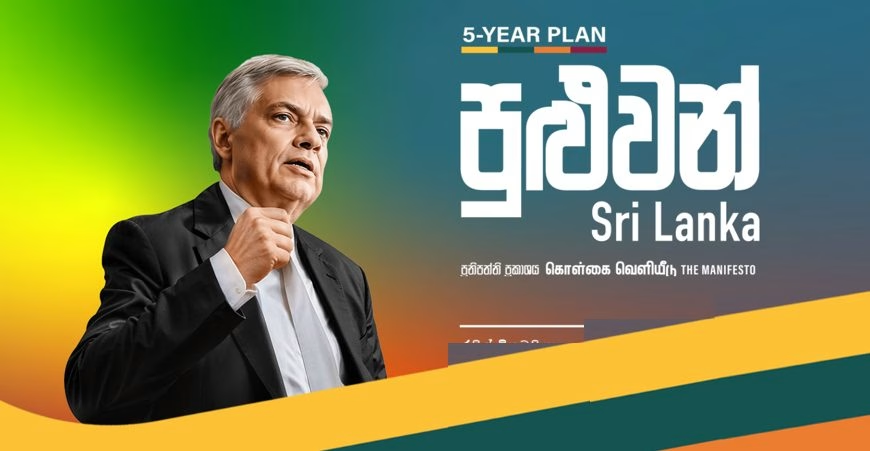President Ranil Wickremesinghe Launches Five-Year Development Manifesto
Colombo, Sri Lanka – (LankaXpress) President Ranil Wickremesinghe unveiled his five-year development manifesto titled “Five Years of Winning the Country with Ranil” today at the Taj Samudra Hotel in Colombo. The comprehensive policy document, which outlines a roadmap for economic recovery and national development, focuses on five key areas: “Theravada Trade Economy,” “Operation – Beyond 2025,” “Make a Radiant Society,” “Win the Motherland,” and “Unite Sri Lanka.”
Key Components of the Manifesto
The manifesto outlines several initiatives aimed at improving the economic and social conditions in Sri Lanka. Among the top priorities is easing the cost of living, generating employment, offering tax relief, and promoting sustainable economic growth. The President announced that 100,000 new employment opportunities will be created as a first step to address the current economic challenges.
A significant feature of the manifesto is the financial allocation for 50,000 school leavers, providing them with technical training to enhance their employability. Additionally, the government plans to revise tax policies, with the International Monetary Fund (IMF) agreeing to reconsider current tax conditions. This revision aims to adjust tax brackets and rates, providing relief to citizens amid the ongoing economic crisis.
Social and Economic Reforms
Addressing the economic hardships faced by 25% of Sri Lanka’s population, the manifesto sets a target to reduce this figure to 10% over the next five years. This will be supported by a national social security policy. The “Aswesuma” program, which offers financial support up to Rs. 15,000 to 2.4 million families, will be further integrated with the Samurdhi movement to strengthen its impact on poverty alleviation.
The document also emphasizes government control over the economy through competitive management by state-owned banks, financial institutions, and enterprises. A separate authority will be established to oversee a new program granting land rights to citizens, targeting two million beneficiaries. Additionally, the manifesto includes plans to complete the transfer of ownership of low-income government housing in Colombo within four years.
Housing and Infrastructure Development
The manifesto commits to offering concessional housing loans to the middle class, assisting low-income earners in acquiring flats, and granting land rights to plantation workers living in new villages and line rooms. It also prioritizes the involvement of impoverished community groups in regional development programs, aiming to employ them in local infrastructure projects.
Plans are also in place to strengthen the economy by creating a “People’s Sector,” establishing a “National Wealth Fund,” and restructuring the cooperative business sector. To enhance transparency and representation, the manifesto promises to increase trade union representation on the boards of the Employee Provident Fund and Employee Trust Fund while minimizing their use for government activities.
Climate, Agriculture, and Trade Initiatives
The manifesto outlines a strong focus on climate change, with plans to establish a Secretariat for climate initiatives and a dedicated climate change fund. In agriculture, it aims to introduce a competitive, export-oriented modern agriculture sector and allocate 300,000 acres of underutilized government land for commercial crop cultivation. Paddy farmers will receive Rs. 25,000 directly for fertilizer and other needs, and a guaranteed price will be set for each season.
To boost trade and investment, the manifesto proposes establishing a new Economic Commission and a National Productivity Commission. It also includes plans to modernize school infrastructure to meet technological advancements expected by 2040, and to improve foreign training opportunities for health staff while constructing public hospitals proportionate to population needs.
Urban Development and Infrastructure
The policy document outlines ambitious plans to develop the region from Kalutara to Negombo into a unified urban area. It also proposes creating a disaster control plan for cities prone to natural calamities and improving water supply to areas facing water scarcity, including dry, upcountry, and coastal regions.
President Wickremesinghe’s manifesto, “Five Years of Winning the Country with Ranil,” presents a vision of economic recovery and national development aimed at fostering growth, social equity, and environmental sustainability over the next five years. The document has set a comprehensive agenda for the future, focusing on economic stability, social welfare, and infrastructural development.

